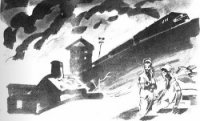Go Set a Watchman - Lee Harper (книги без регистрации полные версии TXT) 📗
“No sir,” she said.
“Think, girl. Think. Since you are not thinking, I’ll give you a hint. When Stanley was Dean of Westminster he dug up nearly everybody in the Abbey looking for James the First.”
“Oh my God,” she said.
During the Depression, Mr. Finckney Sewell, a Maycomb resident long noted for his independence of mind, disentombed his own grandfather and extracted all his gold teeth to pay off a mortgage. When the sheriff apprehended him for grave-robbery and gold-hoarding, Mr. Fink demurred on the theory that if his own grandfather wasn’t his, whose was he? The sheriff said old Mr. M. F. Sewell was in the public domain, but Mr. Fink said testily he supposed it was his cemetery lot, his granddaddy, and his teeth, and declined forthwith to be arrested. Public opinion in Maycomb was with him: Mr. Fink was an honorable man, he was trying his best to pay his debts, and the law molested him no further.
“Stanley had the highest historical motives for his excavations,” mused Dr. Finch, “but their minds worked exactly alike. You can’t deny he invited every heretic he could lay hands on to preach in the Abbey. I believe he once gave communion to Mrs. Annie Besant. You remember how he supported Bishop Colenso.”
She remembered. Bishop Colenso, whose views on everything were considered unsound that day and are archaic in this, was the little dean’s particular pet. Colenso was the object of acrimonious debate wherever the clergy gathered, and Stanley once made a ringing Convocation speech in his defense, asking that body was it aware that Colenso was the only colonial bishop who had bothered to translate the Bible into Zulu, which was rather more than the rest had done.
“Fink was just like him,” said Dr. Finch. “He subscribed to the Wall Street Journal in the depths of the Depression and dared anybody to say a word about it.” Dr. Finch chuckled. “Jake Jeddo at the post office nearly had a spasm every time he put the mail up.”
Jean Louise stared at her uncle. She sat in his kitchen, in the middle of the Atomic Age, and in the deepest recesses of her consciousness she knew that Dr. Finch was outrageously correct in his comparisons.
“—just like him,” Dr. Finch was saying, “or take Harriet Martineau—”
Jean Louise found herself treading water in the Lake District. She floundered to keep her head up.
“Do you remember Mrs. E. C. B. Franklin?”
She did. She groped through the years for Miss Martineau, but Mrs. E.C.B. was easy: she remembered a crocheted tam, a crocheted dress through which peeped pink crocheted drawers, and crocheted stockings. Every Saturday Mrs. E.C.B. walked three miles to town from her farm, which was called Cape Jessamine Copse. Mrs. E.C.B. wrote poetry.
Dr. Finch said, “Remember the minor women poets?”
“Yes sir,” she said.
“Well?”
When she was a child she had deviled for a while at the Maycomb Tribune office and had witnessed several altercations, including the last, between Mrs. E.C.B. and Mr. Underwood. Mr. Underwood was an old-time printer and stood for no nonsense. He worked all day at a vast black Linotype, refreshing himself at intervals from a gallon jug containing harmless cherry wine. One Saturday Mrs. E.C.B. stalked into the office with an effusion Mr. Underwood said he refused to disgrace the Tribune with: it was a cow obituary in verse, beginning:
O kine no longer mine
With those big brown eyes of thine….
and containing grave breaches of Christian philosophy. Mr. Underwood said, “Cows don’t go to heaven,” to which Mrs. E.C.B. replied, “This one did,” and explained poetic license. Mr. Underwood, who in his time had published memorial verses of indeterminate variety, said he still couldn’t print this because it was blasphemous and didn’t scan. Furious, Mrs. E.C.B. unlocked a frame and scattered the Biggs Store ad all over the office. Mr. Underwood inhaled like a whale, drank an enormous slug of cherry wine in her face, swallowed it down, and cursed her all the way to the courthouse square. After that, Mrs. E.C.B. composed verse for her private edification. The county felt the loss.
“Now are you willing to concede that there is some faint connection, not necessarily between two eccentrics, but with a—um—general turn of mind that exists in some quarters across the water?”
Jean Louise threw in the towel.
Dr. Finch said more to himself than to his niece, “In the 1770s where did the white-hot words come from?”
“Virginia,” said Jean Louise, confidently.
“And in the 1940s, before we got into it, what made every Southerner read his newspaper and listen to newscasts with a special kind of horror? Tribal feelin’, honey, at the bottom of it. They might be sons of bitches, the British, but they were our sons of bitches—”
Dr. Finch caught himself. “Go back now,” he said briskly. “Go back to the early 1800s in England, before some pervert invented machinery. What was life there?”
Jean Louise answered automatically, “A society of dukes and beggars—”
“Hah! You are not so far corrupted as I thought, if you still remember Caroline Lamb, poor thing. You’ve almost got it, but not quite: it was mainly an agricultural society, with a handful of landowners and multitudes of tenants. Now, what was the South before the War?”
“An agricultural society with a handful of large landowners, multitudes of dirt farmers, and slaves.”
“Correct. Leave the slaves out of it for a while, and what do you have? Your Wade Hamptons by the scores, and your small landowners and tenants by the thousands. The South was a little England in its heritage and social structure. Now, what is the one thing that has beat in the heart of every Anglo-Saxon—don’t cringe, I know it’s a dirty word these days—no matter what his condition or status in life, no matter what the barriers of ignorance, since he stopped painting himself blue?”
“He is proud. He’s sort of stubborn.”
“You’re damn right. What else?”
“I—I don’t know.”
“What was it that made the ragtag little Confederate Army the last of its kind? What made it so weak, but so powerful it worked miracles?”
“Ah—Robert E. Lee?”
“Good God, girl!” shouted her uncle. “It was an army of individuals! They walked off their farms and walked to the War!”
As if to study a rare specimen, Dr. Finch produced his glasses, put them on, tilted his head back, and looked at her. “No machine,” he said, “when it’s been crushed to powder, puts itself together again and ticks, but those dry bones rose up and marched and how they marched. Why?”
“I reckon it was the slaves and tariffs and things. I never thought about it much.”
Dr. Finch said softly, “Jehovah God.”
He made a visible effort to master his temper by going to the stove and silencing the coffeepot. He poured out two cups of blistering black brew and brought them to the table.
“Jean Louise,” he said dryly, “not much more than five per cent of the South’s population ever saw a slave, much less owned one. Now, something must have irritated the other ninety-five per cent.”
Jean Louise looked blankly at her uncle.
“Has it never occurred to you—have you never, somewhere along the line, received vibrations to the effect—that this territory was a separate nation? No matter what its political bonds, a nation with its own people, existing within a nation? A society highly paradoxical, with alarming inequities, but with the private honor of thousands of persons winking like lightning bugs through the night? No war was ever fought for so many different reasons meeting in one reason clear as crystal. They fought to preserve their identity. Their political identity, their personal identity.”
Dr. Finch’s voice softened. “It seems quixotic today, with jet airplanes and overdoses of Nembutal, that a man would go through a war for something so insignificant as his state.”




